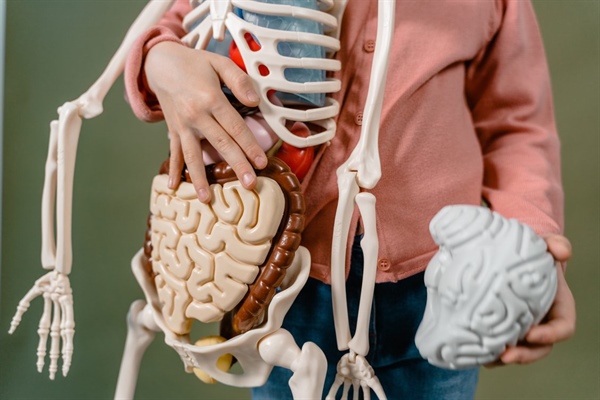What Hinders Your Body's Ability to Heal?

The current medical model in the United States is reactive, meaning it addresses your health once an issue is present. One could argue that this should then be called “sick care” instead of health care.
True HEALTH care is living a proactive lifestyle that intentionally adds or eliminates things in your daily rhythms that improve or maintain your current state of health. Those intentional, life-giving habits nourish your spirit, mind, and body and PREVENT sickness, disease, and pain so you can live, love, and serve better.
At Restore, we have the privilege of fostering true health and healing in our patients by improving the function of the nervous system, which controls and coordinates all the other functions in the body. When your nervous system is free of nerve inference and built up stress, your body can heal better, and therefore feel better, without having to take medications or use outside interventions to treat a symptom.
While chiropractic care certainly helps heal numerous health concerns, regular adjustments also MAINTAIN an individual's good health once symptoms go away. Just like whole foods, water, sunlight, movement and sleep are critical for optimal health, so is a well functioning nervous system.
So what should someone DO or AVOID to keep their nervous system healthy? Keep reading to find out, plus learn how antibiotics impact your health and how chiropractic has helped one of our very own practice members heal from chronic pain.
What Types of Stressors are Inhibiting Your Body's Ability to Heal?
There are a number of stressors that can harm the body's ability to thrive and heal itself. Those stressors can be put into 3 different categories: physical, emotional, and chemical stress.
When stressors remain high it leads to dysfunction in the nervous system which results in a weakened state of health. Getting gentle, specific chiropractic adjustments helps keep stress from building up and negatively impacting the overall function of your brain and body.
Here are some tips to lower the total stress load on your nervous system. For more helpful ideas, click here.
To lower physical stress:
- Improve your posture! Head over shoulders, feet on the ground
- Exercise 30+ minutes/day, 5 days/week
- Sleep 8 hours per night. 10pm-6am is an ideal window.
To lower chemical stress:
- Ditch any personal care products containing fragrance, parabens, phthalates, SLS, and aluminum
- Read food labels and avoid: artificial colors, artificial sweeteners, high-fructose corn syrup, added sugar, nitrates, nitrites, seed oils (canola, sunflower, grapeseed, safflower, soybean & corn), "natural flavors"
- Limit pharmaceutical drug use and antibiotics
To lower emotional stress:
- Identify and eliminate toxic emotional relationships
- Have boundaries between work & home life
- Create habits involving devotionals, prayer or meditation
True, lasting health starts with YOU. With small, daily changes that lower your stress, strengthen the organ systems in your body, and remove nerve interference so your body can heal itself from the inside out.
What are you doing to be proactive about your health, prevent symptoms, and heal quicker?
Schedule Appointment
6 Reasons to Avoid Using Antibiotics
While antibiotics are essential for treating serious bacterial infections, their misuse and overuse can lead to several negative consequences. Here are some reasons to avoid using antibiotics unless absolutely necessary:
- Disruption of Gut Microbiota: Antibiotics not only target harmful bacteria but also disrupt the balance of beneficial bacteria in the gut. This disruption can lead to gastrointestinal issues, such as diarrhea, and weaken the immune system's ability to fight off future sickness and disease.
- Allergic Reactions: Like any medication, antibiotics can cause allergic reactions in some individuals. These reactions can range from mild skin rashes to severe anaphylactic shock, which is a life-threatening condition. The AAP states that up to 5% of children prescribed antibiotics have an allergic reaction.
- Risk of Allergies, Asthma, and Obesity: Some studies suggest a link between early antibiotic use and an increased risk of developing allergies, asthma, and eczema. There is also evidence to suggest that early antibiotic use in children may be associated with an increased risk of obesity later in life. Disruption of the gut microbiota and metabolic changes could be contributing factors. More research is needed to fully understand this relationship.
- Misdiagnosis of Viral Infections: Antibiotics are only effective against bacterial infections, not viral infections. However, many common illnesses, such as the cold, flu, sore throats, and ear infections are typically caused by viruses. Prescribing antibiotics for viral infections is not only ineffective but contributes to antibiotic resistance. Why risk compromising your child's gut and immune system when antibiotics may not work?
- Antibiotic Resistance: One of the most significant concerns related to antibiotic overuse is the development of antibiotic-resistant bacteria. When antibiotics are used too frequently or inappropriately, bacteria can adapt and become resistant, rendering these drugs ineffective in treating infections when they are genuinely needed.
- Clostridioides difficile Infection (C. difficile): Prolonged or unnecessary antibiotic use can disrupt the natural balance of bacteria in the intestines, creating an environment conducive to the growth of C. difficile bacteria. C. difficile infection can cause severe diarrhea and lead to life-threatening complications. According to the American Association of Pediatrics (AAP), antibiotics cause diarrhea and vomiting in approximately 15% of children who take them.
Story of Healing: Stephanie

Stephanie began struggling with knee pain in her pre-teen years and nothing she tried resolved the pain... until she started getting regular adjustments at Restore.
Now, as a wife and mom to two precious young children, she's incredibly thankful that chiropractic care has resulted in significantly less knee pain and helps to manage the pain in her shoulders and back due to stress and anxiety. She feels healthier overall in mind, body, and spirit and can't imagine not having regular adjustments.
"Chiropractic is a saving grace for me! There is continuous healing in my pain levels both physically and emotionally. As a busy mom of young children and a business owner, chiropractic is key to staying healthy."
Stephanie is not the only one in her family benefiting from taking care of their nervous system. She states that her family absolutely loves coming to Restore and that they have all seen significant improvements in their health and lives by making chiropractic care a priority.
We know Stephanie isn't the only parent out there dealing with back or knee pain and a heightened stress load from work and family responsibilities. If you can relate, we'd love to help you improve your stress response and the function of your nervous system so you can show up as the BEST VERSION of yourself for your family, friends, and job.